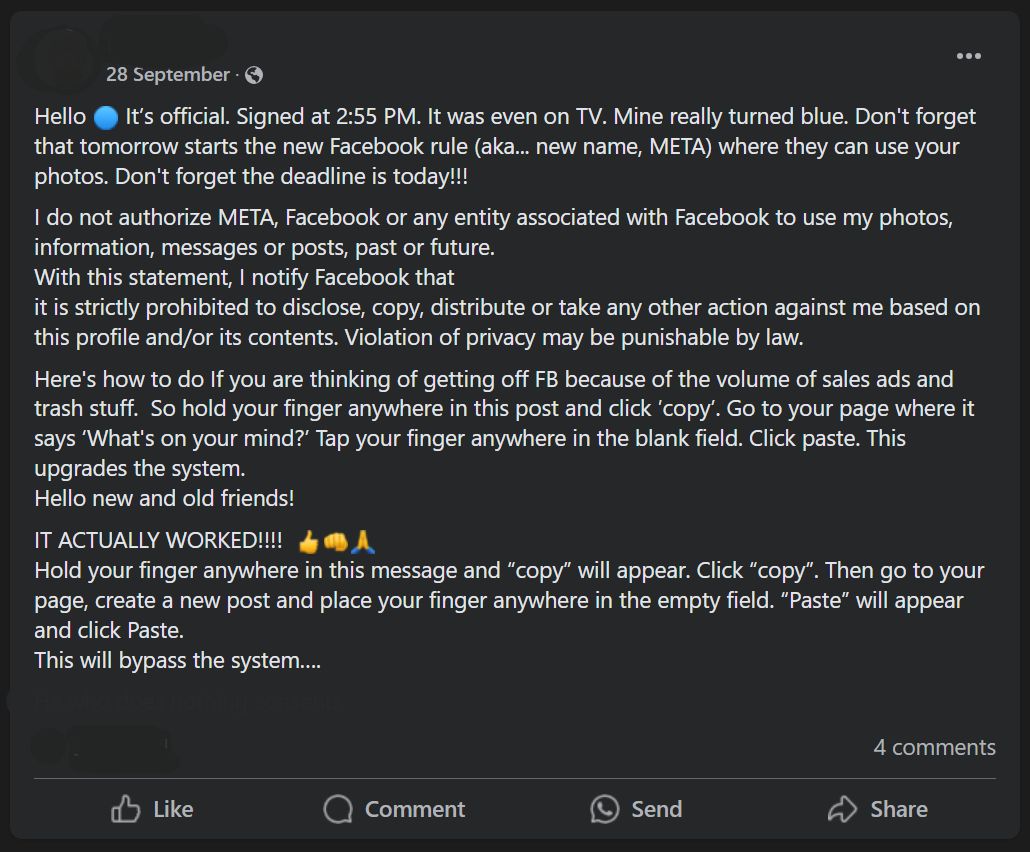You’ve likely seen Facebook posts asking you to copy and paste a message to your feed. These posts might claim Facebook will start charging for its services, warn that your account is at risk, or promise a prize. On the surface, they seem harmless but they’re a subtle tool scammers use to identify trusting individuals who are more likely to fall for phishing or other cyberattacks.
For individuals and businesses, the real danger isn’t the post itself—it’s what comes next. Scammers monitor who engages with these posts to build a list of potential targets, it’s easy to do: all they need is to type an unusual phrase from the post into the Facebook search function to find who has reposted. Having gathered a list of potential victims they can then escalate their tactics, sending phishing messages, malicious links, or attempting to compromise accounts. For businesses, this could mean stolen login details, malware infections on work devices, or scammers impersonating a business page to trick customers.
Why These Posts Work
Copy/paste scams rely on trust. Scammers use social engineering to exploit human behaviour, particularly emotions like fear, greed, and the need for social validation. A post warning that your account might be hacked creates urgency, prompting people to act without questioning its legitimacy. Similarly, fake offers or competitions appeal to people’s desire for rewards, encouraging them to engage quickly.

Even seeing these posts shared by friends or colleagues adds a layer of false legitimacy. Users think without scrutiny, “If others are sharing it, it must be real.” This trust in personal networks allows scams to spread rapidly.
The Risks for Businesses
Businesses face even greater risks from these scams. If employees engage with scam posts on work devices or accounts, the consequences can escalate quickly. Clicking a phishing link could compromise login credentials for critical systems like email, cloud platforms, or finance tools. Malicious software might infect a device, disrupting operations or exposing sensitive data. If scammers take over a business’s Facebook page, they can impersonate the company to deceive customers or tarnish its reputation.
Even employees engaging with scams on personal accounts can pose indirect risks. Many people reuse passwords or access work systems from personal devices. A single compromised account can act as a gateway for further attacks.
Protecting Your Business and Employees
The best way to defend against these scams is through awareness and clear guidance. Employees need to understand that posts asking them to copy and paste messages are not harmless. These scams are often the first step in a chain of attacks that can escalate into far more serious threats.
Regular discussions about online security are key. Social media training doesn’t need to be lengthy or complex—simple conversations about recognising scams and thinking critically about shared content can make a significant difference. For example, employees should be encouraged to ask: “Does this post seem urgent or too good to be true? Would I question it if it came from an unknown source?”
Establishing clear social media policies also helps. Employees should know what’s appropriate to share, even on personal accounts, and when to flag suspicious posts. In addition, businesses must secure their social media platforms with strong, unique passwords and multi-factor authentication to reduce the risk of unauthorised access.
Stay Vigilant Everywhere
These tactics aren’t limited to Facebook. Scammers use similar methods on WhatsApp, email, and other platforms. Forwarded messages claiming you’ve won a prize, fake job offers, or urgent warnings about security issues are all variations of the same trick. On email, phishing scams often disguise themselves as messages from trusted organisations, while other social media platforms are increasingly targeted for impersonation scams.
The tactics are repetitive, but they work because they exploit human habits. Early recognition of these patterns—across all platforms—is the best defence.
The Bottom Line
Copy/paste Facebook posts may look harmless, but they’re a well-worn tactic for scammers to identify trusting users. By engaging, individuals signal themselves as potential targets for phishing, malware, and account takeovers. For businesses, the consequences can include data breaches, financial loss, or reputational damage.
Staying vigilant begins with awareness. By helping your employees recognise scams and setting clear expectations for social media use, you can significantly reduce your risk. It’s not just about protecting personal accounts but safeguarding your business’s digital environment from unnecessary threats.
For more insights on online security or to learn how we can support your business, subscribe to our blog or contact us today.
Further Reading: How bad Facebook security can be a business nightmare
